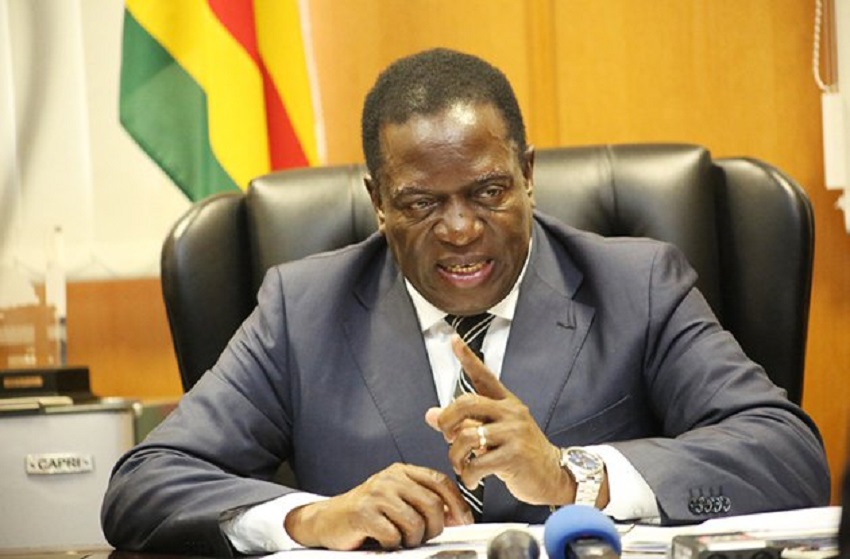
The Sunday News

Mabasa Sasa in New York, US
President Emmerson Mnangagwa has said Zimbabwe has no quarrel with the United States government and its people, and he is pleased with the way relations between the two countries are improving.
Zimbabwe’s Head of State and Government made these remarks while responding to questions from the floor at the Zimbabwe Investors’ Forum, organised by private equity firm, Exotix USA Inc in New York on Friday.
The President was at the highly-subscribed Forum together with Finance and Economic Development Minister Professor Mthuli Ncube and Reserve Bank of Zimbabwe (RBZ) Governor Dr John Mangudya.
President Mnangagwa is in the United States for the 73rd Ordinary Session of the United Nations General Assembly, where he will this week deliver his maiden speech to the world’s largest international organisation since winning the 2018 Presidential elections.
At Friday’s investment forum, President Mnangagwa was asked why Zimbabwe’s opposition appeared to have a strong lobby in Washington and New York, and what his Government was doing to improve relations.
The President pointed out that differences between the two countries stemmed from a bilateral dispute between Harare and London, but that ties between those two were normalising and there was no need for America to remain aloof when Zimbabwe was opening up to the world and shedding off its negative perceptions in the international community.
He also said Zimbabwe wanted to enter “a new era” of relations with the US.
President Mnangagwa said, “With regard to sanctions: Initially the quarrel was not between the people of the United States of America and the people of Zimbabwe. The quarrel was between Zimbabwe and the United Kingdom. It was a bilateral quarrel.
“But the British were able to internationalise our bilateral quarrel between ourselves and them, which roped in the EU, and then it roped in the Americans through former President (George W) Bush, and in Britian there was Tony Blair.
“But I’m happy now they have a lady. You know when we got our Independence in 1980, in 1979 there was a very serious war in Zimbabwe against Ian Smith. But there was a change of government in the United Kingdom and Margaret Thatcher came to power. She was the person who ended our war.
“So each time there is a lady in Britain, things change. This time around, on the 24th of November (2017) when I was inaugurated, within 35 minutes I had a minister from (UK Prime Minister) Theresa May calling on me. Our relations with Britain have improved tremendously and we are now talking.
“So America is left out in the cold by the British and the EU. But I’m happy that also the German (leader) is a lady. She has sent a minister to come and resuscitate relations between Zimbabwe and Germany. And we are so happy with Germany. The same with France, though he is a man but again, he’s very good.”
He went on: “So the basic point I’m making is, there is no problem, there is no quarrel between the people of Zimbabwe and the people of America. Historically or currently, there is no quarrel. The quarrel is at the level of administration, where Zidera (the US sanctions law on Zimbabwe) was put — you know that history.
“But just now the signals that are coming from Washington are very positive. I have no doubt that in no time we should be able to reconcile and move forward, and co-operate with the United States of America.
“I’ve no doubt that Zimbabwe again can rise in the community of nations, this is what we are doing: re-engaging with those who had disengaged with us, engaging with those who have never engaged with us. This is the policy we are following now.
“Perception is very, very critical. It can lead one to believe even in things that are not actually correct on the ground. Yes, the lobby here favours the opposition, but the voter on the ground actually looks at what is being offered.”
Earlier in his keynote address, President Mnangagwa had said Zimbabwe wanted economic co-operation with the US based on a fresh approach to bilateral issues.
“Zimbabwe stands ready to enter a new era of relations with the United States of America and pursue economic co-operation and further re-ignite mutually beneficial trade and economic co-operation between our countries and peoples. The onus is on the private sectors of the two countries to complement my Government’s efforts,” he said.
He explained the Second Republic’s priorities thus: “Zimbabwe is on a bold course to modernise and industrialise every sphere of the country through a vibrant private sector-led economic recovery.
“The key tenets of our economic agenda include sweeping and comprehensive economic reforms which foster an investment-friendly environment that promotes and protects private enterprise, improves the ease of doing business, reduces the country risk perception, creates employment, eradicates corruption and enhances public sector accountability, transparency and good governance.
“My country has a vision to become a middle-income economy, with a per capita income of about US$3 500, increased investment, decent jobs, broad-based economic empowerment, and free from poverty and corruption by 2030.
“We are fully cognisant that foreign direct investment will play a major role in the attainment of this noble vision, hence we invite investors among you to travel this journey with us.”
He invited American firms to take advantage of special economic zones, saying Government stands ready to facilitate such investments.
“The enactment of the Zimbabwe Investment and Business Facilitation Bill, and establishment of the One-Stop Shop Investment Centre will also give greater impetus to our commitment to open up the economy . . .
“We are resolved to make Zimbabwe an attractive and safe investment destination, where capital feels safe.
“In addition, I have committed that my administration will ensure policy clarity, consistency, transparency and predictability.”



